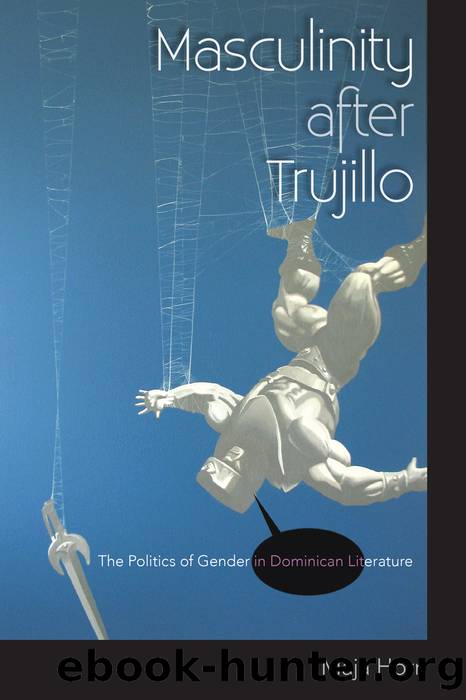Masculinity after Trujillo by Horn Maja;

Author:Horn, Maja;
Language: eng
Format: epub
Publisher: University Press of Florida
Published: 2016-08-15T00:00:00+00:00
4
Still Loving Papi
Globalized Dominican Subjectivities in the Novels of Rita Indiana Hernández
In 1996 a new president took office in the Dominican Republic and seemed to promise a significant break with the previous government (1986â1996) of the now very old, feeble, and almost blind Balaguer. In contrast, Leonel Fernández was relatively young, educated, New Yorkâraised, and thus also part of the Dominican diaspora. Fernándezâs political discourse avidly reinforced this sense of a new beginning in Dominican politics; he stylized himself emphatically as a âmodernâ president and vociferously embraced neoliberal economic policies and modern technology as ways to fast-track the countryâs progreso, all encapsulated in his governmentâs ubiquitous forward-looking slogan âEâ paâlante que vamosâââWe Are Moving Forward.â
Past political patterns, however, asserted themselves quickly under the âmodernâ Fernández presidency. This continuity became evident early on when the new president decided not to investigate the blatant corruption cases from the Balaguer years, and when his government got caught up in the same clientelist and corrupt patterns that had long predominated in Dominican politics. As Michiel Baud asserts, the government remained âanchored in a political culture in which clientelism and authoritarianism played an important role. Fernández could not break with these cultural ties.â1 The important role of such âcultural tiesâ indicates how paying attention to formal political processes alone misses how cultural forces contribute to shaping the political landscape in the Dominican Republic (as they do elsewhere).
Specifically, what is overlooked thereby is how understandings and expectations that have become âcommon senseâ among Dominicans continuously reinforce prevailing relations between the populace and the political realm. These relations, I argue, help contribute to reproduce the practices of clientelism and corruption that are generally considered responsible for the countryâs often perplexing political stagnancy vis-Ã -vis its dramatic economic, social, and cultural transformations over the past decades.2 Scholars frequently remark upon this apparent paradox: while developments closely associated with rapid modernization and globalizationâincluding urbanization, migration, tourism, and free trade zonesâare seen to have led to a profound transformation of the countryâs society, culture, and economy, the political sphere has remained notably stagnant.
This chapter considers this paradox of persisting political patterns, reinforced by certain âcommon senseâ conceptions, existing alongside processes of rapid modernization and globalization through the lens of the literary work of Rita Indiana Hernández, a key figure of the generation of writers that emerged at the turn of the century in the Dominican Republic.
Gender in the Global Age
Among one of the most notable Dominican cultural transformations is the âgreat explosion of media and consumer cultureâ during the twentieth century.3 As Jesse Hoffnung-Garskof describes, in A Tale of Two Cities: Santo Domingo and New York after 1950 (2008), âafter midcentury, Dominican middle and lower classes learned of the practical allure of automobiles, household products, electronics, and leisure goods. They grew attentive to the symbolic value of brand names, hairstyles, clothing, and commercial media. What Dominicans, even those of modest means, owned, wore, watched, or heard became progressively more important in defining their everyday lives.â4 This eruption of consumer culture reshaped Dominican society in ways that would have important political implications as well.
Download
This site does not store any files on its server. We only index and link to content provided by other sites. Please contact the content providers to delete copyright contents if any and email us, we'll remove relevant links or contents immediately.
The Power of Myth by Joseph Campbell & Bill Moyers(1068)
Half Moon Bay by Jonathan Kellerman & Jesse Kellerman(987)
A Social History of the Media by Peter Burke & Peter Burke(987)
Inseparable by Emma Donoghue(983)
The Nets of Modernism: Henry James, Virginia Woolf, James Joyce, and Sigmund Freud by Maud Ellmann(913)
The Spike by Mark Humphries;(812)
The Complete Correspondence 1928-1940 by Theodor W. Adorno & Walter Benjamin(789)
A Theory of Narrative Drawing by Simon Grennan(782)
Culture by Terry Eagleton(776)
Ideology by Eagleton Terry;(743)
World Philology by(719)
Farnsworth's Classical English Rhetoric by Ward Farnsworth(715)
Game of Thrones and Philosophy by William Irwin(712)
Bodies from the Library 3 by Tony Medawar(709)
High Albania by M. Edith Durham(705)
Adam Smith by Jonathan Conlin(695)
A Reader’s Companion to J. D. Salinger’s The Catcher in the Rye by Peter Beidler(688)
Monkey King by Wu Cheng'en(654)
Comic Genius: Portraits of Funny People by(652)
